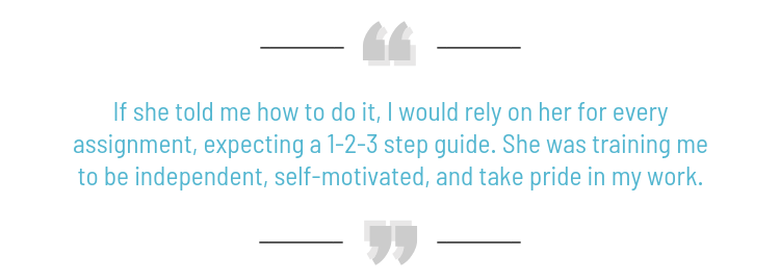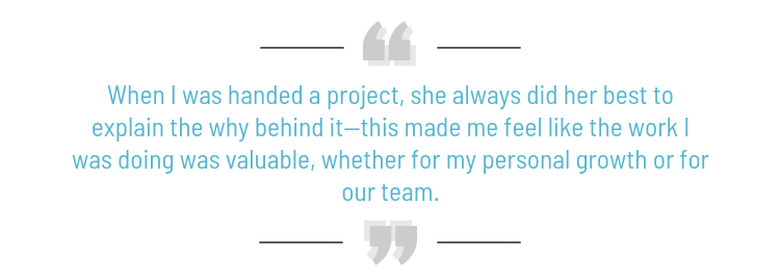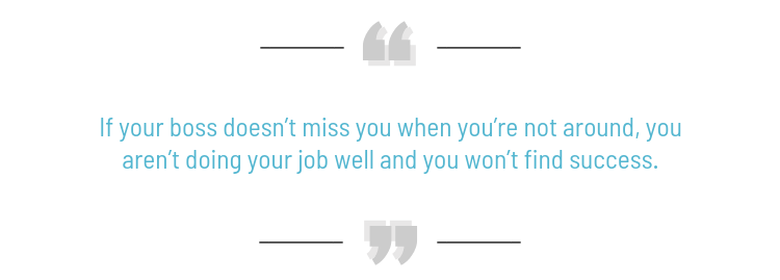Some bosses really stick in your memory. Often, it’s two kinds that leave the most indelible marks: the horrible bosses and the amazing ones.
The former teach you what kind of boss you want to actively avoid going forward (and the kind you never want to become yourself).
The latter, on the other hand, might become your mentors. But even if that’s not the case, there’s a good chance you’ve still carried the lessons you learned from them to your next job and every one after that.
We asked 11 people to highlight lessons learned from their favorite managers. No matter what kind of boss you have right now, you can apply these valuable pieces of advice in your own career.
1. Own Your Work
Early in Alisha Chocha’s marketing career, her boss asked her to redesign the monthly email newsletter. She told her to figure it out and come to her if she got stuck.
“I almost died. How could my manager really give me an assignment that vague?” she recalls. She knew only very basic HTML at the time, but she did her research and came up with a new template that increased both clicks and sales.
“If she told me how to do it, I would rely on her for every assignment, expecting a 1-2-3 step guide. She was training me to be independent, self-motivated, and take pride in my work,” Chocha says.
She ended up co-founding her current company, Your Marketing People, with that very same boss. “We’ve discovered some incredible talent who rise to the occasion,” she says. “And we’re training a team to be true go-getters.”
2. Remember the Goal
When Muse sales development representative Megan Cull was working as a program director, she was also frequently on the receiving end of customer complaints. There was one customer in particular who seemed to have an endless supply.
“She really did not like me,” says Cull, but seemed to love her boss when he got involved.
Cull asked her manager to meet “to learn how he turned a negative customer into a positive one.” “He told me that sometimes it’s less about proving you’re right, and more about how you make someone feel,” she explains. He taught her to always remember what the ultimate goal is. “So the next time she had a complaint—which she did—then I focused on making her feel understood because my goal was to have a happy customer, rather than discounting her claims.”
As a reminder, she printed out “WHAT IS THE GOAL??” and hung it over her computer.
3. Listen More
In her first post-MBA job, Paige Arnof-Fenn was “a bit of a handful,” she admits. “I was often impatient, brash, frustrated, outspoken, and did not like being at the bottom of the totem pole.”
But then she got a new boss. “She was a quiet leader who never tried to talk over people but when she made a comment everyone listened,” explains Arnof-Fenn, now the founder and CEO of global branding and marketing firm Mavens & Moguls.
“I saw how effective her style was and how people reacted to her and decided I wanted to be smart like her. I made a very conscious effort to listen more and only make comments when I had something big to say,” she adds. “When I left that job I just started being that way from the start in meetings and people never knew that I was more of a pop off before.”
4. Ask for What You Want
Today, Antonella Pisani is the founder of the startup FACT goods and the ecommerce and digital marketing firm Eyeful Media. But two decades ago, she was working on creating partnerships at a company called WebSideStory. While reviewing business development contracts with the CMO, he used the phrase: “No asky, no getty!”
It may sound simple, but Pisani found it helpful in that role and every job she’s held since (and has passed it on as she became the boss). “This applies to everything from asking for additional discounts when buying advertising, to negotiating a job offer,” she explains. “And it’s catchy enough to stick with people.”
5. Focus on the Why
Muse editor Alyse Kalish learned from her favorite boss to focus on the why.
“When I was handed a project, she always did her best to explain the why behind it—this made me feel like the work I was doing was valuable, whether for my personal growth or for our team,” Kalish says. “When I launched a project or suggested an idea, she encouraged me to think about why it would be worth pursuing, what goal it was tied to, and why it would help our team.”
This lesson has helped Kalish prioritize, stay motivated, and be transparent in her own projects. “If I make a major revision on an article, if I push back a meeting, if I decide not to continue a project,” she explains, “I want people to know why so they can also make smarter decisions going forward.”
6. Keep Things Moving and Delegate
Nothing will ever be perfect. You also can’t do everything yourself. Theo Lee, co-founder and CEO of KPOP Foods, learned both of these lessons when he was the manager of finance at a fintech startup reporting directly to his CEO.
“Startups are constantly strapped for resources, such as money and manpower, but maybe one of the most important is time,” Lee says. “It’s more important to get things moving than making things absolutely perfect.”
Part of this, he adds, is learning how to delegate. In the early days, Lee would often start off projects, such as designing the website and creating an Instagram account. But he realized he couldn’t keep his hand in every project, remembered his former boss’s example, and passed over various components to his team.
7. Be Curious
Brian Sowards, Enterprise Account Executive at The Muse, previously founded and ran his own startup, USEED, a crowdfunding platform for higher education. The chairman of his board taught him, by example, how important it is to be curious.
“I never met someone who genuinely asked so many questions about so many things, even when I knew he was tired or stressed,” Sowards says. “I found it’s helped my career a ton because people really enjoy when you are curious about them and what they do. It actually makes it easier to deal with difficult situations because curiosity is like a smile, it’s hard to feel anxious when you’re doing it!”
8. Always Carry a Notebook
Jessica Peters, Business Operations Project Manager at The Muse, recently spoke to one of The Muse’s founders in passing. Their spontaneous conversation was a spitfire of ideas and questions to clarify. Luckily, Peters had a notebook on her, and she wrote everything down.
It’s one of several lessons she learned while working for the chief marketing officer and CEO at Overstock. Peters was one of two executive assistants who worked with the CEO. He was excited to see she brought a notebook everywhere, and, well, not so excited to see that her counterpart didn’t. Needless to say, Peters went on to always carry something she can use to jot down notes.
9. Make Yourself Indispensable
Niyati Desai attributes her professional growth at least in part to a lesson she learned from one of her first bosses: “If your boss doesn’t miss you when you’re not around, you aren’t doing your job well and you won’t find success.”
She learned to anticipate her boss’s needs and questions—basically, to make herself indispensable. “I saw my boss do this daily for her boss,” Desai says.
To this day as a PR manager for the software company PlanGrid, Desai makes sure she’s chasing down missing information or items she knows her boss needs to deliver on a particular project, and offers to handle tasks on her boss’s plate.
In a nutshell, “if my boss doesn’t see my value, he or she is also not likely to advocate for me behind closed doors, and I probably won’t see that promotion or new project assignment I really want.”
10. Build a Solid Network
For several years, Dave Yonkman worked as the director of communications for then-U.S. Representative Pete Hoekstra.
One of the lessons that stuck was to create a solid network. Yonkman, now founder and president of DYS Media, made a habit of collecting hundreds of business cards and writing notes on the backs about the people he’d met and their interests—a practice he continues to this day.
11. Do Small Tasks Immediately
Anytime Jennifer McDermott’s about to add something to her to-do list, she asks herself, “Or could I just do it now?”
It’s a lesson McDermott’s boss emphasized when she was part of a PR team at The Travel Corporation. “She hated to see items on there that potentially made me look busier, but only took a few minutes to complete,” says McDermott, who now heads communications for the personal finance website finder.
The change of habit became so deeply ingrained that it’s now part of her daily routine. “I start my day with a to-do list and while I have my morning tea, work through and do anything that can be done immediately such as a quick email reply, making an edit to a webpage, or making a booking,” she says.
You may not have a role model in your professional life right now, but that doesn’t mean you can’t adopt some of these lessons. They’ll certainly help you grow, and they might lead you to a new opportunity—and your own great boss.






